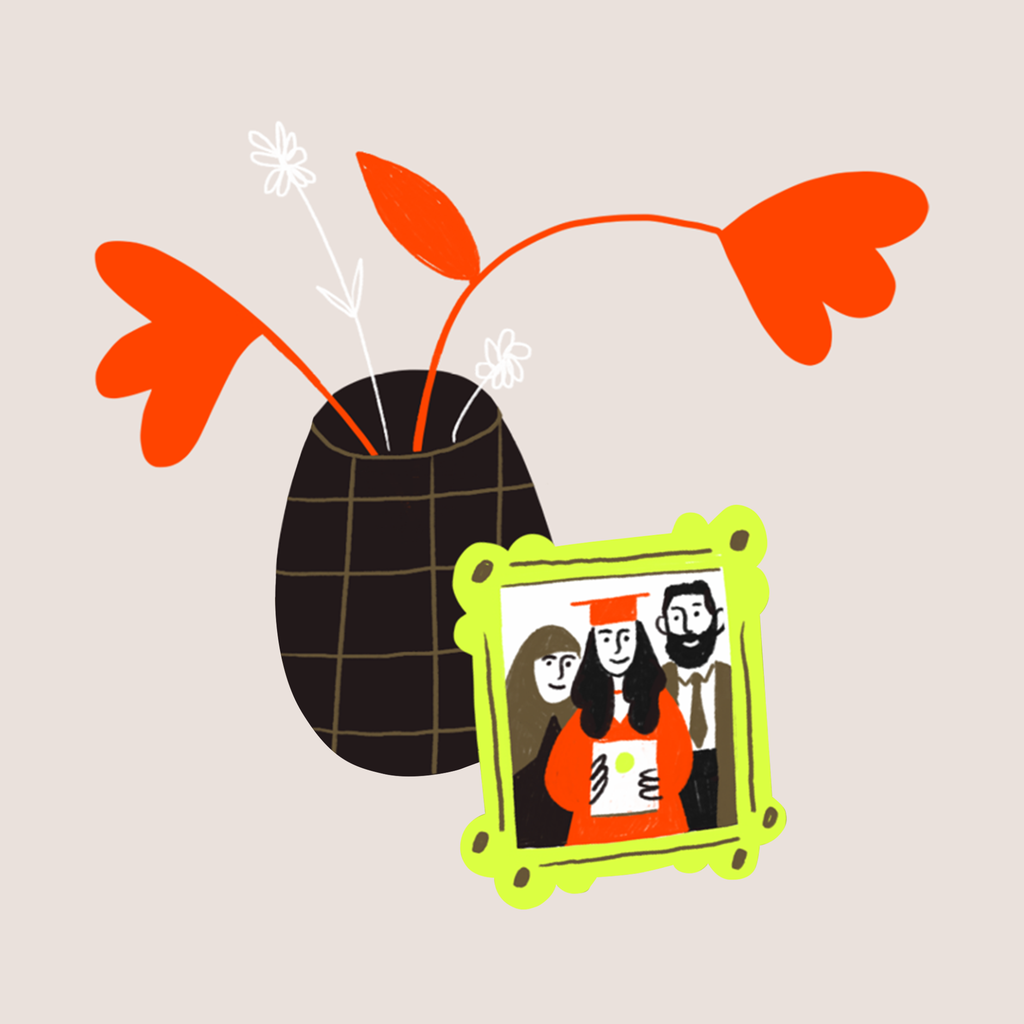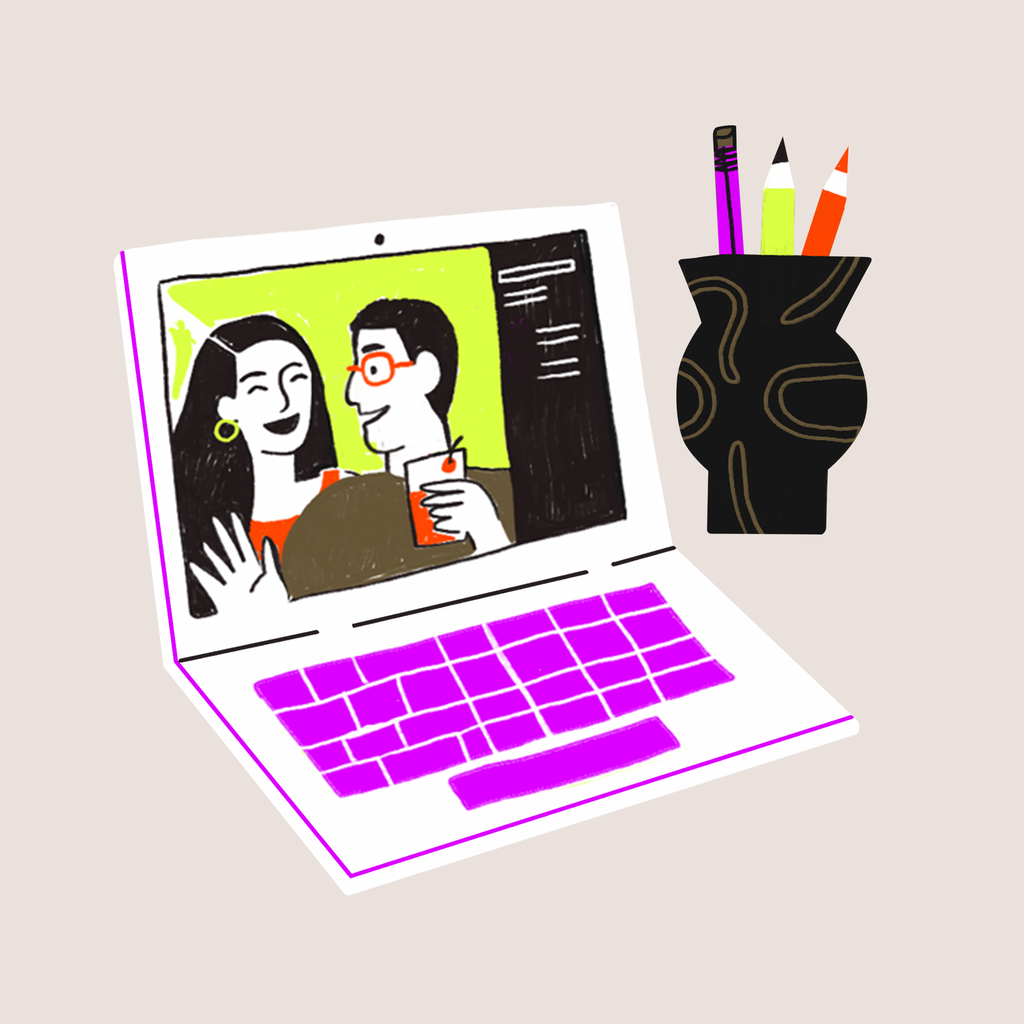I started wearing the hijab a few months shy of my 13th birthday, as a commitment to my Muslim faith and dressing modestly. That’s also when I got glasses and braces and began high school. It was 2005, when nerdy-girl-gets-a-makeover movies were at their peak. It’s safe to say that I didn’t adhere to the conventional beauty standards of the day.
In defiance, I developed my own personal style: loud, expressive, colorful… and modest. I layered yellow stripes with purple polka dots and blue floral prints. When other girls wore strapless gowns to prom, I thrifted a blue full-sleeve dress and fashioned a yard of silver sequin fabric to wear as a hijab. I loved my look, but it’s safe to say it did not bring all the boys to the yard.
And so it would go for 10 years. I had fun with fashion, had (probably unrequited) crushes from afar, and was unbothered about the fact that I didn’t date and that I intended to save myself for marriage.
A year into university life, however, my rose-colored glasses about Islam started to change hue. It wasn’t one event, but rather several that began to shift my mind: being put on the spot by a professor about a passage in the Quran, Islam’s holy book, that some interpret as condoning wife-beating; being told by the male president of the Muslim Student’s Association that it would be ill-advised to have a woman speak on a panel about women in Islam (public speaking, as he argued, is far too immodest of an activity for a woman to undertake). Instances like these made me question my religion — or at least, mainstream Sunni Islam’s stance on issues like homosexuality and gender equality. My transition out of the faith wasn’t a completely smooth one. Over the years, I would go through an angry atheist phase and a feminist Muslim phase before finally, exhausted with the cognitive dissonance, I settled into where I am now: an agnostic.

Before my final semester of university, at 22, I decided to stop wearing the hijab. It simply no longer held any meaning for me. And frankly, I was tired of being the face of a religion that I had so many doubts about.
The first time I stepped out of the house without the hijab, I felt like everyone was staring. Of course, they weren’t. But it soon became obvious that without the covering, I was under the spotlight of the male gaze in a way I had never experienced before. It was as if by taking off my head covering, a flip had been switched and men suddenly began to notice me.
Men had flirted with me before, but very rarely. The first time it happened, I was 20 and living in Singapore. While eating out with a group of new friends, the waiter kept passing glances at me as he went around the table. He double-checked with me — and only me — to make sure that my order was right. I was a little bewildered by the attention. I was still practicing Islam, and therefore not even considering dating. Being (perhaps annoyingly) well-versed in post-colonial theory, my only thought was: Are the beauty standards in Singapore less Eurocentric than in Canada?
Two years later, though, I wasn’t just shedding the hijab, but also my belief in some of the Muslim values that had been instilled in me as a child and young adult: that modesty is a virtue, that sex outside marriage is wrong. Gone were the loose, long clothes; instead I bought dresses with plunging necklines, barely-there miniskirts, and spaghetti strap tank tops for the first time. I went on dates that turned into one-night stands. Without even realizing it, I had dived deep into the throes of modern hookup culture. I soon ticked off a number of firsts that a year earlier would have seemed unfathomable to me: drink, kiss, date, hookup…

I quickly got used to the experience of a person expressing interest in me. It was exciting, fun, empowering. I was taking charge of my sexuality, which had long been taboo. As I moved around to different countries, hookups were some of the first ways I met locals.
Meeting new men offered a great way to practice languages. (I still have screenshots of my early, embarrassing attempts at sexting in Spanish.) These connections also gave me a better understanding of things like Eritrean food, the Baha’i faith, Egyptian politics, Zambian history, Guatemalan sports teams, and so much more.
While the pervasive cultural norm in cis-hetero pairings pins the desire for committed relationships on women, and the desire for casual sex on men, more often than not, it’s been me telling guys that I didn’t want anything more. While I’d always assumed that one day I’d get married, I was distancing myself from some of the expectations I’d held as a Muslim and a Pakistani woman. And I was thriving as a single, non-committal, and independent young woman. I didn’t need to be tied down to any one man — there was a whole world out there to see.
Sometime in the last year, however, a question began nagging at me: How am I 28 and have never been in a relationship?
It hadn’t bothered me before. I’d been so focused on carving out a different space for myself in the world — one separate from the Muslim girl I’d been until I was 22 — that being single had become a cornerstone of my identity. And while I still celebrate my singlehood, and I still enjoy casual dating, these days I’m also nursing a burgeoning desire for something more meaningful. And I’m still coming to terms with that shift.
The one time I did get close to something resembling a relationship was with someone on the other side of the world who I met on Twitter. Under the constraint of distance, I emotionally connected with a man for the first time. Back then, I wasn’t looking for anything serious, and the “relationship” ended. But to this day, I wonder what would have happened if we had met in person. Would we have connected, or would we have slept together on the first date, then a few times more, before eventually fading out into nothing, the anticlimactic finale of modern hookup culture?
Perhaps I’ve been questioning myself recently because I’ve been ruminating about my past conversations around hookups. Several times, I’ve had a partner break things off because they’ve entered a relationship. I don’t mind — I’ve only wanted something more with a couple of the people I’ve hooked up with — but often just weeks before, these men were agreeing with me about how much they loved being single. I can’t help but ask myself: Did they not want a relationship, or did they not want to be with a woman they consider easy?
I pride myself on the work I’ve done to embrace my desires and shed the stigmas I grew up with. But slut-shaming has come up even with the more ‘progressive’ men I’ve hooked up with, and while I try to not let it affect me, it does. My hijab catered to the male gaze by putting the onus on how I, as a woman, covered up; my revealing clothes cater to the male gaze by giving into it. In the past, I would have seemed too prude, now I’m perhaps perceived as too sexual.
Another factor may be my social circle. Despite their distinct cultures, races, locations, and sexualities, the easy majority of my friends are now in committed, long-term relationships. Some are even beginning to have children. With my constant moving, my previously large groups of friends have shrunk dramatically. Without a bustling social life, and especially during the pandemic, I see the appeal of having a partner who could be my travel buddy, dinner date, and lazy-Sunday-night-in companion.
I still scoff at the thought of marriage (though my mom constantly pesters me about it, fulfilling the South Asian stereotype). But the idea of long-term, monogamous companionship — and a truly equal partnership — has begun to sound appealing. In fact, just before the pandemic hit, I had made a resolve to date more seriously. Of course, I’ve abandoned the idea for the time being: Besides COVID-19, I’m also living abroad in a place where I don’t plan on being permanently.
But regardless of what’s in store for me in the future, I don’t regret any of my past. While wearing the hijab and other aspects of Islam weren’t empowering for me, they shaped who I am today. Similarly, taking charge of my sexuality as a brown woman by flitting from one fling to the next in my 20s was fun, even though I’m finding it less empowering these days. In a world where women and femmes will always be judged for what we do and don’t do, I’ve found empowerment and freedom in choosing to do what makes me happy — even if exactly what that is changes as often as the men in my life.
The Single Files is a bi-monthly column. Each installment will feature a personal essay that explores the unique joys and challenges of being single right now. Have your own idea you’d like to submit? Email single.files@vice.com.
Like what you see? How about some more R29 goodness, right here?
What Dating During COVID-19 Has Taught Me
How To Have The "Mental Health Talk" On A Date
What It’s Like To Be Single At (Kind Of) 31
from Refinery29 https://ift.tt/2JJddxG
via IFTTT
